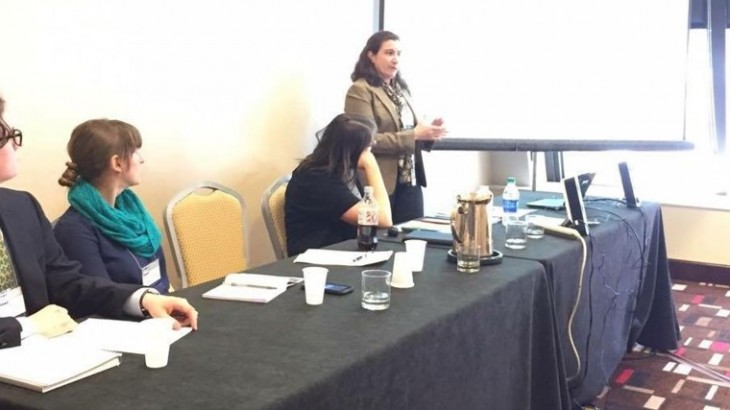EIUI team member Elizabeth De Santo (Department of Earth and Environment, Franklin & Marshall College) presented a paper at the International Studies Association (ISA) conference in Atlanta, GA on March 17th. Entitled “Militarized Marine Protected Areas: synergizing security and conservation objectives?”, Dr. De Santo’s paper was part of a panel she chaired on “Securing Marine Environments”, which she organized with colleagues working on fisheries and marine policy at universities in the US and Norway, including field work in South Asia. Her presentation focused on large Marine Protected Areas (MPAs) designated by the US in the Pacific with current or former military presence, which may have future strategic importance. This is part of a larger project examining the intersection between conservation and strategic/military objectives in overseas island territories of the US, UK, and France that have been designated as MPAs. The panel and paper abstract are detailed below:
SECURING MARINE ENVIRONMENTS
Chair: Elizabeth De Santo (Franklin & Marshall College)
Discussant: Jennifer L. Bailey (Norwegian University of Science and Technology)
Participants:
- Tiller & Nyman. “The Hague” or: How to pick an international court – Maritime Edition
- De Santo. Militarized Marine Protected Areas: synergizing security and conservation objectives?
- Ford et. al.. Transboundary Fishing Conflict Resolution: Two-level Games, Leadership Change, and Confidence Building between India and Sri Lanka
- Novak & Axelrod. Human Security and Livelihoods: Preventing and Exacerbating Conflict during a Seasonal Fishing Ban in Tamil Nadu, India
- Nyman. Maritime Energy and Environment: Security Tradeoffs?
Militarized Marine Protected Areas: synergizing security and conservation objectives? (Abstract)
This paper examines the role of spatial approaches to marine conservation in a security context. Marine Protected Areas (MPAs) are an important tool for biodiversity conservation, and targets set by the UN Convention on Biological Diversity are encouraging nations to set aside 10% of their national waters by 2020. For former colonial powers with significant overseas territories, such as France and the UK, or newer nations with comparatively recent overseas acquisitions (e.g. the US), these distant regions provide an opportunity to achieve biodiversity conservation objectives over large spatial scales. Several of the recent MPA designations in such territories are on the scale of hundreds of thousands of square kilometers, and some of these regions either include military bases that are exempted from the rules set by the MPA (e.g. Chagos), or were themselves the site of military conflict in World War II (e.g. Pacific Remote Islands Monument). In addition, some of these regions may also contain oil and gas reserves of strategic importance, and/or populations that have been in conflict with the MPA designation. This paper examines the multiple motivations behind designating very large MPAs, from “securing” biodiversity to more “militarized” motivations that may be hiding behind conservation objectives.
